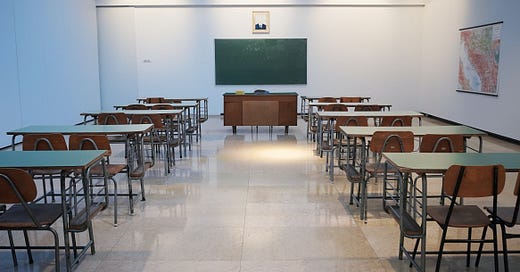Welcome to the third edition of Change Everything, an email newsletter that mixes science, history and politics.
Book news
Please forgive me for being parochial, but the big news of the week is that my first book Change Everything: How We Can Rethink, Repair and Rebuild Society has gone to the printers! Launch date is set for March 21, and if you pre-order now it can be in your letterbox, or inbox, then. Only £5.99 for the e-book, £10.99 plus shipping for the paperback.
Picks of the week
Reading
Two medieval English women who deserve to be far more famous than they are - Margery Kempe, Christian mystic, and Julian of Norwich, anchoress and author of Revelations of Divine Love - meet in Victoria MacKenzie’s For Thy Great Pain Have Mercy on My Little Pain (reviewed here by the Guardian and soon out in paperback). A short book, but one with soaring imagination. Margery must have been “a bloody difficult woman”, to borrow Ken Clarke’s description of Theresa May, something that comes out in another excellent fictional treatment of her adventurous life (which includes a pilgrimage to Jerusalem). That’s Ffiona Perigrinor’s Reluctant Pilgrim: The Lost Book of Margery Kempe’s Maidservant.
And since I’m in Norwich, have to mention the diaries of Margaret Fountaine, published by Penguin as Love Among the Butterflies: The Travels and Adventures of a Victorian Lady. The diaries are in Norwich Castle Museum, where I bought the book in 1990, though it looks like you’ll have to find a secondhand copy now. At the age of 27, this Victorian-born lady got her financial independence, and then travelled the world as a skilled lepidopterist.
Listening
The Common Descent podcast is about the many varied and wonderful forms of life on Earth today and in the past, starting section with recent paleontology news. It isn’t short - but is easy listening. Many episodes take a thematic approach - like the most recent one on camouflage, and a brilliant one on plant defences, that will bring you up to date with a huge amount of recent research showing how plants don’t just wait around to be eaten, but are active participants in their own surivial (characteristics that we’ve largely bred out of domesticated crops). Other episodes cover particular groups. I was glad to update myself on monotremes, undoing a lot of inaccurate stereotypes I was taught decades ago in Australia, and came to understand just how sociable dinosaurs could be in the episode on hadrosaurs.
Thinking
I expect in the coming year to return - through the form of secondary legislation - to the issue of gene edited plants and animals. These are, as the campaigners say, “genetically modified organisms with better PR”. Claims that only using genetic material from the same organism, rather than, for example, introducing jellyfish genes into zebrafish (which have subsequently escaped into the wild), is not creating GMOS do not stack up, as I wrote for Green World last year. If you want to read up on where we are, and where we should and shouldn’t go, this manifesto from Beyond GM is a good place to start.
Researching
Fascinating further discoveries about the relationship between fungi and trees. One of the traditional explanations for the relative diversity of tropical forests, and lack of diversity the closer you get to the poles, is that pathogens, both bacteria and fungi, prevent young trees establishing around their parents. But there may also be a protective effect from the ectomycorrhizal fungi that form a sheath around plant roots. These are more common at higher latitudes. Arbuscular fungi, which penetrate into the plant, by contrast are more common near the equator. They tend to be less species-specific, and can work with a variety of trees around them. What’s really controlling this planet? Humans are doing a good job of wrecking it, while other organisms are - literally - holding it together.
18th-century natural curiosity versus 21st-century exam factories
A book about humble people doing science at home in these islands in the long 18th-century (c. 1660-1830) might not seem to have any obvious political relevance today. But reading Leonie Hanan’s A Culture of Curiosity: Science in the Eighteenth-Century Home, (note to Manchester University Press, could we get an affordable paperback/e-book version please?) I was left reflecting on the burgeoning, widespread desire to learn in this period when education wasscarce and expensive and self-education was something the state often actively sought to suppress. There was too an enthusiasm to share, and at least limited preparedness to consider, discoveries made by the relatively humble before the narrow professionalisation of knowledge in academia.
The background to Hanan’s work is the uncovering at the end of the last century of feminist scholars of the major role played by women in the domestic space in the foundations of the science for which men at the time claimed the glory and financial rewards. (See Pandora’s Breeches: Women, Science & Power in the Enlightenment, and Women Science and Medicine 1500-1700.) Women had to do science as part of their daily round. As the royal tutor and school founder Bathsua Makin said: “To buy wool and Flax, to die scarlet and purple, requires skill in natural philosophy.” But most of the researches uncovered in that period of scholarship were relatively high up the social scale.
Hanan goes further, setting out how “servants, masters and mistresses; apprentices, transpeople, professionals and the leisured landed class. All of them engaged in enquiry using practices learned at home.” One lovely example is of two Quaker apprentices in Dublin, Robert Jackson and Thomas Chandlee, who were in their scant spare time, often giving up sleep, were seeking to learn, through observation and reading, as much as they could about astronomy. Also in Dublin, a Parish Constable, Isaac Butler, became well known as an almanac writer covering “meteorology, botany, mineralogy, archaeology and astrology”. The Ladies’ Diary or Woman’s Almanack, published from 1704-1840, removed recipes to allow space for mathematical challenges that were the source of vigorous dialogue.
The practical experience so often discounted today was given, more or less free rein, as when the Gentleman’s Magazine in 1794 printed “an Account of a Method of curing Burns and Scalds by Mr David Cleghorn, Brewer in Edinburgh”. In a note to the first of three letters, the editor praises “the production of a plain, sensible and well-informed man”. In Cleghorn’s second letter, he appeals to a prominent doctor in Edinburgh, Mr Day, to pay attention to his discovery and not ignore it “merely because it happens to be stumbled upon by a person not of the medical profession”. (Sounds familiar.)
If the motive was sometimes underlyingly commercial, such as the attempts to learn about the cultivation of silk worms that led in 1778 the Society for the Encouragement of Arts, Manufactures and Commerce to give a bounty of 20 guineas to Mrs Ann Williams (a post mistress at Graves End) for her reseatch, and a silver medal to Miss Henrietta Rhodes (a spinster from a gentry family who spent a lifetime as a writer and researcher) for her rearing of the insects silk production, there was still an obvious, intense curiosity.
Where has it gone? The Victorians sought to discipline children’s enthusiasm and interest, schooling them into being obedient workers and servants, graded and disciplined for exams. So too today. One of the saddest things I ever heard was a teacher telling me that he actively discouraged his potential A* A-level students from reading around the subject, or following their interests within it. To get that A* virtually every word they wrote in the exam had to get them a mark. Including interesting facts demonstrating wide engagement with the subject - but not in the marking schema - would be actively disadvantageous.
Yet when we saw a big blow-up this week in politics about the high levels of children not attending schools now, the issue of the content and structure of schooling did not get a mention. There were promises from the government of a “crackdown on truancy”, and Labour trying to sound just as ‘hard’ on parents ‘condoning’ absences. It was all a slightly cleaned-up version of MP James Daly’s now infamous “crap parents” claim. (Neither party talked about the continuing impact of Covid and other respiratory conditions in schools still often lacking adequate ventilation or filtration, or much about the draining impact of continuing austerity slashing away support services.)
But there was from neither of the largest parties any question about whether the nature of schooling was an issue. Whether the schools forced to become exam factories, the young people labelled as failures by testing from their earliest lives, was discouraging attendance, didn’t make the discussions. But it should have.
As I was reflecting for Left Foot Forward over the festive season, just like prison and welfare policy, our approach to schooling essentially remains Victorian. The same subjects, the same focus on tests and exams, the same attempt to turn out good little cookie-cut workers. Sure there might be a fancy whiteboard for the teacher and tablets for the students, but otherwise most classrooms and what is taught in them would be entirely familiar to a schoolmistress of 1900.
That’s deeply unhealthy. It is not working. It does not deliver the skills for life needed in the 21st century. And it is killing the natural curiosity of children - a curiosity that we need to cultivate in a world facing so many challenges.
Photo by Ivan Aleksic on Unsplash
Almost the end
It struck me this week that some explicitly good news is in order in each Substack. So this week, how one man saved a language, Chaná, There’s a lovely report in The New York Times, but if you don’t have access to that, Wikipedia does a good job with the story. Every language is a unique way of looking at a place and the world; it is wisdom accummulated over the ages. Every one lost is a tragedy
What did you think?
You can also find me on Instagram, Facebook, LinkedIn, TikTok and X.








Good News Update: A Culture of Curiosity is available online open access at this link. Thanks to Leonie for letting me know that: https://www.manchesterhive.com/display/9781526153050/9781526153050.xml